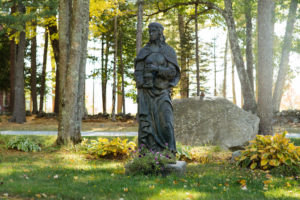A Letter from President Harne to Students, Families, Alumni, and Friends:
Readers of classic books will know that both T.S. Eliot and William Shakespeare contributed to how we think about names. The line Shakespeare gave to Juliet, “a rose by any other name,” and Eliot’s “The Naming of Cats” immediately spring to mind.
Here at the college we’ve been thinking a lot about names as of late and, though it has not led to English verse that will be known through the ages, it has produced unexpected results.
In just a few days, on the Feast of the Assumption, the college will begin a campaign to propose the college and its mission to the broadest possible audience and at the launch of this campaign, the college will take up again the name it received at its founding: Magdalen College.
As a result of conversations across the college for the last year, the board of trustees has decided that now is the time—as the college prepares to “set out into the deep” in new and unprecedented ways—to complete the renewal and re-founding that began eight years ago by taking up the name bestowed by the college’s three founders. As our founding president and current member of the faculty, Dr. Peter Sampo, recently observed: “The name perfectly represents our mission: we are Catholic and academic.”
 This name is powerful, beautiful, and full of wonderful layers of meaning and suggestion. These include Mary Magdalen herself, who as the apostle of the apostles is represented on our campus in paintings, statues, and stained glass. Her feast has been celebrated consistently on campus each July 22 for decades and her name has been invoked at the end of prayers for just as long.
This name is powerful, beautiful, and full of wonderful layers of meaning and suggestion. These include Mary Magdalen herself, who as the apostle of the apostles is represented on our campus in paintings, statues, and stained glass. Her feast has been celebrated consistently on campus each July 22 for decades and her name has been invoked at the end of prayers for just as long.
And these meanings and suggestions also include the great spiritual and intellectual heritage of Magdalen College, Oxford. C.S. Lewis was a fellow at Magdalen and during his time at Oxford his friendship with Tolkien flourished, shaping the larger circle of authors we know today as the Inklings. And in the larger history of Oxford—of which Magdalen is a constitutive college—Blessed John Henry Newman, who will be canonized in just two months on October 13, also figures prominently.
As we look toward our upcoming fiftieth anniversary in 2023, we are profoundly grateful for all that we have been given. And we are grateful for the grace that was present at the college’s founding and the sacrifices of each of its founders.
By the time this fiftieth anniversary arrives, we expect—Deo volente—to have not only reached capacity enrollment but to be expanding the college’s residences. Between now and then we will work to ensure that our college’s name, mission, and all that it offers to the Church and the world will be known across this nation. And we will do this in order to support every Catholic family, parish, apostolate, and leader that cares deeply about the education of our children and prays for the future of the Church and our society.
And we have plans that will enable the college to take the education it offers to communities throughout the United States in innovative ways.
As a first step to achieving this, we have produced a new film that captures our unique vision of Catholic liberal education of the whole person. Beginning in the next few days, this film and supporting media will be carried far and wide with a single message: there is hope for the Church today and there is a place where our future leaders—both in the Church and the broader society—can receive a transformative education of the complete person.
And note what this also signifies: the college is building on the developments of the last eight years of renewal. Its commitment to serving Catholic families by offering an extraordinary liberal education in a vibrant Catholic community will only grow stronger. Our common-sense approach to student life—reflecting the teachings of the Church and her understanding of the human person—will remain the same. The celebration of the liturgies of the Church—marked by reverence, beauty, and the very best sacred music—will continue to animate our common spiritual life. We will continue to cultivate the vision of cultural renewal that we have learned from Josef Pieper and we will continue to embrace courageously Pope Saint John Paul II’s vision of the transforming power of the Splendor of Truth for contemporary society.
I would be happy to discuss further this taking up again of the founding name. If you would like to schedule a call, please contact Ginger Iverson at [email protected] for more information.
Today, I ask for three things: (1) please watch the film we have produced and share it as widely as you can with friends and family, (2) visit our website and explore the new achievements, initiatives, and vision that is presented there, and (3) pray for us that we will be faithful to the calling with which we have been entrusted.
In cordibus Jesu et Mariae,
George Harne, Ph.D.
President
